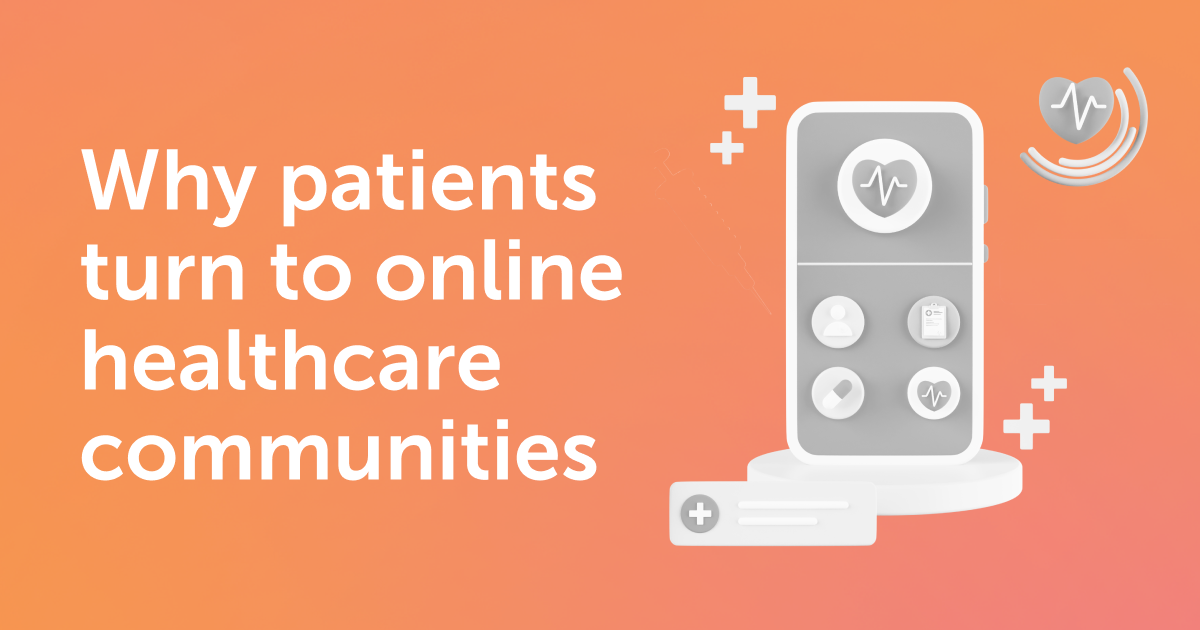Using online communities to develop patient-centric care
The healthcare industry is under immense pressure to evolve and adopt new technologies, but one of the most important factors in providing successful healthcare is building trust with patients.
Every day, people are faced with difficult healthcare decisions. In these moments they can often feel alone. Those around them are supportive, but they do not know the answers to their questions. Online searches seem to reveal only worst-case scenarios and their doctor only gives so much advice and support.
When gathering information to make such a big decision, patients are searching for someone who understands the decision and can show them what helped them and what didn’t. By providing patients with online spaces where they can build community, healthcare providers build trust and increase their confidence in the patient, making them feel more in control during the decision-making process.
To create this sense of control, healthcare providers need to provide resources that make patients feel like they’re in their court. The best way to do this? Provide support beyond the doctor’s office. Create an online community where patients can ask questions and provide their support.
It's important to understand what patients want and need from an online healthcare community. There is a need for a supportive, knowledgeable, and trustworthy community for patients who are seeking medical care. They want to be able to find answers to their questions, share their experiences and connect with others going through similar health journeys.
Content, Engagement, and Privacy = Trust
Through an online community platform, providers can curate content relevant to their patients. They can engage patients, who want to find support in one another, by giving them the ability to interact with one another or with ways to share their experiences, advice, and ideas. In all these interactions a level of privacy needs to be maintained–HIPAA-compliant data usage, levels of anonymity,
CONTENT AND ENGAGEMENT
With content, consistency is key. Content––articles, videos, polls– is the spark that keeps people coming back, at first for the content itself and then to join discussions and build connections. A further step some communities take is to ensure someone is readily available to answer questions and provide support. Patients should feel like their concerns are being heard, but with a community, they can feel like their concerns are being understood–by people who are experiencing as they are.
In order for patients to initially engage, healthcare providers should be transparent about their intentions for the community–explain they're creating the community and how it can benefit their patients. They should also be clear about the rules and guidelines for participation and make sure that the community is properly moderated so it remains a safe and supportive space for patients.
PRIVACY AND TRUST
HIPAA compliance is important for online healthcare communities because it guarantees that patients’ personal information is protected. Patients will feel more secure sharing their experiences when they know their data is being held to a high healthcare standard.
In an online healthcare community anonymity is also an important factor to consider. Patients may be reluctant to share personal information if they feel like their identity will be revealed without their consent. With an online platform, patients can make accounts with annonymous usernames, thus preserving their anonymity.
Anonymity allows patients to feel safe sharing their experiences. It also helps patients feel more comfortable asking questions they may not otherwise feel comfortable asking. When everyone is on the same level, it can be easier to connect with others and feel part of a supportive group.
Provider-created, HIPAA-compliant, communities provide an entirely new way for patients to find support and answers to their questions from other patients. In a place where providers are able to ensure data privacy and members are verified by their providers, patients can feel safe sharing their experiences.
Today patients want to be part of their health decisions, maintain a relationship with their healthcare provider, and feel in control of their healthcare choices. In this shift towards patient-centricity, online communities are an important resource for healthcare companies and providers to build trust with their customers and patients.
Share this
You May Also Like
These Related Stories

Why patients turn to online healthcare communities

Community 101 Series: The Ladder of Community Engagement – A framework for scale, sustained growth, and earned trust

